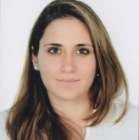Short CV
Foteini studied Chemical Engineering at the University of Manchester specialising in energy and environment. She graduated in July 2014 and achieved a 2:1. She is an Associate Member of IChemE and member of biomass, computer aided process engineering and clean energy special interest group. For the third year design project, she proposed the design of a wastewater treatment plant valorising oil refinery’s wastewaters and producing medium pressure steam from oily sludge. She performed her detailed design on reverse osmosis systems. She extended her wastewater treatment knowledge on a practical level, by uptaking a four-month internship with Alfa Laval, Dubai in the water technology division looking into membrane biological membrane, centrifuges and thickeners. She then returned to university to complete her MEng thesis under the supervision of Prof Schroeder in the area of gold catalysis. Her thesis project involved the synthesis and characterisation of bimetallic gold catalysts. She is proficient in using Aspen Plus, HYSYS and other chemical engineering simulation software packages. During her undergraduate studies, she committed herself to positions of responsibly such as welfare and environment hall representative as well as publicity coordinator of Engineers without Borders in Manchester. She has already built some experience in the area of waste management and valorisation. She is hoping to develop her skills further in chemical engineering design and process optimisation.
Reneseng_FBarla
Objective
Foteini’s research area is waste valorisation, optimisation and biorefineries. She is investigating the full integration of waste biorefineries. Starting from industrial and municipal waste, she is aiming to map all possible synthesis routes resulting in a variety of products such as biofuels, energy, value-added chemicals and building-block chemicals. To achieve that, the collection of process and economic data as well as the development of core technology models is necessary. The ultimate aim is to be enable the building of an optimisation platform able to support decision on a technical, economic, environmental, investment and regional development basis.
KEYWORDS: waste, anaerobic digestion, gasification, pyrolysis, extraction, bio-fuels, bioenergy, value added chemicals, building blocks, optimisation tools, superstructure, synthesis path, valorisation, biorefineries, optimisation.
Current Status
A new upcoming area of research is the valorisation of low end use-textile waste. In the following six months, Foteini will research on the various technologies able to assess the added value of all waste textile materials such as cotton, nylon, wool and polyester. She will construct synthesis routes and collect data for each of the conversion technologies and the intermediate chemicals involved.
Future 6-months Plan
A new upcoming area of research is the valorisation of low end use-textile waste. In the following six months, Foteini will research on the various technologies able to assess the added value of all waste textile materials such as cotton, nylon, wool and polyester. She will construct synthesis routes and collect data for each of the conversion technologies and the intermediate chemicals involved.
Publications - Conferences
International Conference of Industrial Waste & Wastewater Treatment & Valorisation: 21-23 May 2015, President Hotel, Athens.
12th International Symposium on Process Systems Engineering (PSE2015) and 25th European Symposium on Computer Aided Process Engineering (ESCAPE25), 1-4 June 2015, Copenhagen.
3rd International Conference on Sustainable Solid Waste Management: 2-4 July 2015, Tinos Hotel, Tinos.
Annex
Fellow
ESR 1.1 |
Host institution
NTUA - PhD enrolment: Y (NTUA or ETH) |
Duration
36 months |
Start date
M6 |
| Project title : A systems approach to enable high-throughput analysis of integrated waste biorefineries with industrial and municipal feedstocks (WP1, WP2, WP3, WP4, WP5, WP6). Supervisor name: Prof. A. Kokossis or someone with the same level of expertise and /or experience |
|
Objectives:
- To produce methodologies for the integration of industrial waste and municipal feedstocks with the biorefineries
- To build modelling capabilities for waste processing technologies
- To build high-level screening tools to assess the valorization of the paths and to select processing technologies appropriate for integration
|
Tasks and methodology:
Task 1 Develop core models for waste processing technologies.
Task 2 Develop synthesis technology.
Task 3 Build optimization capabilities to screen and analyse scenarios produced in Task 2. |
| Results: Library of models for waste processing operations to useful products and bioenergy, Screening models to select valorization paths of industrial and municipal waste, Modelling tool to support decisions for investment and regional development |
| Dissemination: Demonstrations in RENESENG schools and workshops, 2-3 conference proceedings, Participation in 2-3 international conferences (PSE, waste management conferences, Journal for Cleaner Technology), 2-3 journal manuscript in (e.g. Waste and Biomass, C&CE) |
Planned secondment:
- Imperial 2 months - familiarize with gPromS and model libraries available
- EPFL 2 months - collaboration in the frame of WP1 : model developments
- ETH/Quantis 1 months - validate and obtain context for regional case studies and LCA metrics
- BE2020 2 months - obtain context for regional case studies
|

